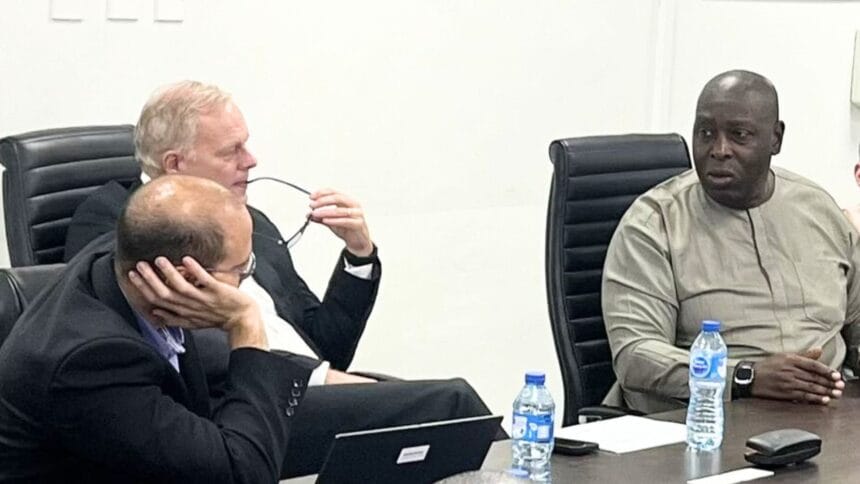…recommend stronger enforcement, competitive oversight by NMDPRA, FCCPC, others
Oredola Adeola
Industry experts have called on the Nigerian Government to adopt a coexistence model that supports both local refining and fuel importation, arguing that such a balanced approach would enhance efficiency and promote a more competitive downstream market.
They also urged the Nigerian Midstream and Downstream Petroleum Regulatory Authority (NMDPRA) and the Federal Competition and Consumer Protection Commission (FCCPC), and other key regulators to strengthen enforcement frameworks and build institutional capacity for effective competitive assessments.
This was the major highlight of the Quarterly Press Webinar and Engagement for the second quarter of 2025, hosted by MEMAN to discuss Fair and Healthy Competition in the Nigerian market and held on Thursday. on the theme: Fair and Healthy Competition.
The experts expressed concern over the current state of Nigeria’s refining sector, which they say remains highly concentrated in the hands of Dangote and a few players, constrained by restrictive policies.
This lack of competitiveness, they warned, has led to inflated fuel prices, reduced product quality, and a departure from the principles of fair market practice.
The engagement brought together key members of the press, industry experts, industry players, and regional associations to examine the role of competition in shaping market dynamics and protecting consumers, particularly amid growing private investments and infrastructure shifts in the industry.
Hub Stockman, Chairman of MEMAN, in his comment stated that, “Where there is competition, it supports both market growth and consumer benefits. At MEMAN, we will continue to advocate for policies that promote free and fair competition. We also look forward to supporting stakeholders working to enhance energy affordability.
He also emphasised that while deregulation opens new opportunities, maintaining fair and open competition is critical.
He urged FCCPC and NMDPRA to ensure consistent oversight, promote innovation, and protect consumers in this new market reality.
Samer Matta, Senior Economist, World Bank, in his presentation emphasized urged the government in the Nigerian downstream and midstream sectors to remain highly concentrated and urging industry regulators to strengthen enforcement frameworks and build internal capacity for Competitive assessment.
“Competition ensures prices remain affordable and prevents the negative effects of monopolistic structures. When markets are dominated by monopolies, inefficiencies and crises tend to arise. In contrast, fair competition drives innovation, improves productivity across firms, and leads to overall economic growth.
“In a competitive market, the most innovative and productive firms thrive, while less efficient ones are naturally phased out. A healthy market allows new, competitive players to enter and grow, which stimulates progress and benefits consumers.
“Monopolies, on the other hand, often lead to complacency and a lack of innovation.
“In countries where competition is limited, economic growth is stifled. Unfortunately, Nigeria is not performing well in the implementation of its downstream and midstream deregulation due to policy and regulatory environments that hinder fair competition.
“For example, Nigeria’s refining sector struggles with competitiveness partly because policies restrict market participation, particularly in product importation.
“To improve, Nigeria should adopt a model similar to Belgium’s, where refining and importation coexist to encourage efficiency and market balance.
Properly managed deregulation is key. Refineries should not have exclusive control over products, as this leads to higher prices, reduced quality, and undermines the principles of competition. For a truly efficient energy market, fair competition must be upheld, and unfair practices must be addressed.”
Francis Anatogu, CEO, Trans Saharan/Inaugural Executive Secretary of the AfCFTA, in his presentation stressed the importance of clear dominance thresholds, transparent market access, and SME protection.
He also urged regulatory agencies to improve coordination and provide accessible complaint channels with timely resolution mechanisms.
He called for stronger enforcement of fair competition principles across Nigeria’s economy, stressing that “everybody is efficient when there is fair competition.”
Anatogu said, “The customer is king, and they make choices,” adding that competitive environments create opportunities for all players and lead to job creation as “everyone is trying to win.”
He noted that commercial banks benefit from such ecosystems, and even microfinance banking activities can flourish within sector-specific frameworks.
He further urged regulatory agencies like the FCCPC to extend their oversight into the energy sector to address overlapping mandates within the oil and gas industry.
He said, “While the enabling act is there, one wonders to what extent the regulations are properly regulated.
He emphasized that regulators must work in the public interest, protecting small players and ensuring that competition is not suppressed.
“Since there are trade-offs, the regulators should ensure that they are safe,” he added.
According to him, operators with infrastructure for importing petroleum products must also be protected and allowed to grow.
“They need to be given an audience to make sure their businesses thrive,” he stated.
Anatogu called on the private sector to call out wrong practices, insisting that roles must be clarified and regulatory overlaps addressed.
“When this doesn’t happen, the focus of the players will be on outpacing each other rather than developing the market,” he cautioned.
Touching on regional opportunities, he highlighted the African Continental Free Trade Area (AfCFTA) as a gateway to new markets.
“With AfCFTA still in its early stages, the Pan-African market provides the opportunity for businesses to have a footprint in various markets, allowing competition to be considered from the start,” he said.
He emphasized the importance of fair competition both within and outside Nigeria, stating that “small and medium enterprises (SMEs), which must be enabled to scale without inhibition under the FCCPC Act, should be allowed without discrimination.
On the issue of market control, Anatogu warned that dominant players, especially those controlling over 40 percent of the market, could stifle fair competition.
“Dominant players should be properly defined to allow fair competition. Anywhere there is a dominant player, there must be policies to ensure that the interests of non-dominant players are protected,” he said.
He concluded by stressing that the rules of the game must be favourable to all, with no preferential treatment.
“This is what will allow competition to flourish. I don’t think we have a specific definition of a dominant player in Nigeria, and this is something that must be addressed. Everyone should be allowed to import or refine locally,” Anatogu said.
Clement Isong, CEO of MEMAN, highlighted the growing use of Compressed Natural Gas (CNG) trucks in fuel distribution, noting that they could cut costs by as much as 40%.
While he acknowledged the innovation, he cautioned that uneven access to supporting infrastructure might give certain operators a disproportionate edge.
He called on regulators to promote widespread access to CNG facilities and encouraged MEMAN members to embrace additional efficiency strategies, such as solar-powered stations and shared logistics, to reduce costs without undermining fair competition.
He also confirmed that MEMAN members continued to receive imported petroleum products as recently as last week, adding that the market is currently saturated with both imported and locally refined products.




